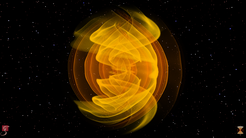Discovery of gravitational waves - what comes next?
Conference in Hannover
May 23 - 26: International scientists gather in Hannover to discuss status and future prospects in gravitational wave astronomy
The era of gravitational wave astronomy began a few months ago with the first direct detection of gravitational waves. The discovery caused worldwide enthusiasm. Even US president Barack Obama tweeted his congratulations to the community.
Now, scientists from all over the world gather in Hannover for a discussion of the most recent developments and the next steps in gravitational wave research. Topics will be:
- The first observation of gravitational waves: new information about the two merging black holes, their origin and their environment.
- The search for gravitational wave signals: methods and procedures.
- Improving the Advanced LIGO instrument: preparations for the next observation period.
- The next challenges in gravitational wave observation.
- Testing General Relativity with gravitational waves.
- Waveform modelling: the key to decode gravitational wave signals.

“I am looking very much forward to our discussions. What we have learned so far is amazing, but we expect to learn even more from future observations,” says Dr. Badri Krishnan, chair of the local conference organizing committee and staff scientist at the Max Planck Institute for Gravitational Physics (Albert Einstein Institute; AEI) in Hannover.
Researchers at the Max Planck Institute for Gravitational Physics (Albert Einstein Institute; AEI) in Hannover and Potsdam, Germany, and from the Institute for Gravitational Physics at Leibniz Universität Hannover (LUH) have made crucial contributions to the discovery in several key areas: development and operation of extremely sensitive detectors pushed to the limits of physics, efficient data analysis methods running on powerful computer clusters, and highly accurate waveform models to detect the signal and infer astrophysical information from it.












